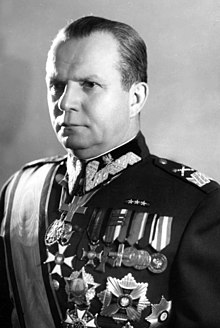Michał Żymierski
| Marshal Michał Rola-Żymierski |
|
|---|---|

Michał Rola-Żymierski as Marshal of Poland
|
|
| Born | September 4, 1890 |
| Died | October 15, 1989 (aged 99) |
| Allegiance |
|
| Service/branch |
Austro-Hungarian Army (1911 - 1914) Polish Legions (1914 - 1919) Polish Army (1919 - 1927) People's Guard (1942 - 1944) People's Army (1944) People's Army of Poland (1944 - 1989) |
| Years of service | 1911 - 1927; 1942 - 1949 |
| Rank | Marshal of Poland |
| Battles/wars | World War I. Polish-Soviet War, 1926 Polish Coup d'Etat, World War II |
| Other work | Minister of National Defence |
Michał Rola-Żymierski (pronounced [ˈmixaw ˈrɔla ʐɨˈmjɛrskʲi]; September 4, 1890 – October 15, 1989) was a Polish high-ranking Communist Party leader, communist military commander, NKVD secret agent, and Marshal of Poland by Joseph Stalin's order from 1945 until his death. He supported the 1981 imposition of the Martial law in Poland.
Rola-Żymierski was born Michał Łyżwiński in Kraków under the Austrian Partition, to a family of railway clerk Wojciech Łyżwiński. At the age of 20, he enrolled at the law faculty of the Jagiellonian University in 1910, but was drafted a year later. After his brother committed widely publicized murder-robbery in Kraków, he began to call himself Żymierski around 1913. When World War I erupted in 1914, he joined the Polish Legions, and fought with distinction on many of the most important battlefields of the Austro-Hungarian Eastern Front. After the Oath Crisis of 1917 he retired from the Austro-Hungarian army and returned to Kraków, where he graduated from the Kraków Trading School.
In 1918 he joined the reborn Polish Army and took part in the Polish-Soviet War. He initially commanded the II Infantry Brigade and then was promoted to the commander of the prestigious Polish Legions 2nd Infantry Division. After the war he was sent to Paris, where he graduated from École spéciale militaire de Saint-Cyr. Upon his return he was promoted to General. Żymierski served in Warsaw as the Deputy Chief of Administration of the Polish Army. During the 1926 coup d'état he defended the democratically elected government of Stanisław Wojciechowski. After the coup, in 1927, the new sanacja regime of Marshal Józef Piłsudski charged him with bribery and embezzlement. Following official investigation, he was court-martialed and demoted to private first class, expelled from the army and sentenced to five years in prison.
...
Wikipedia
